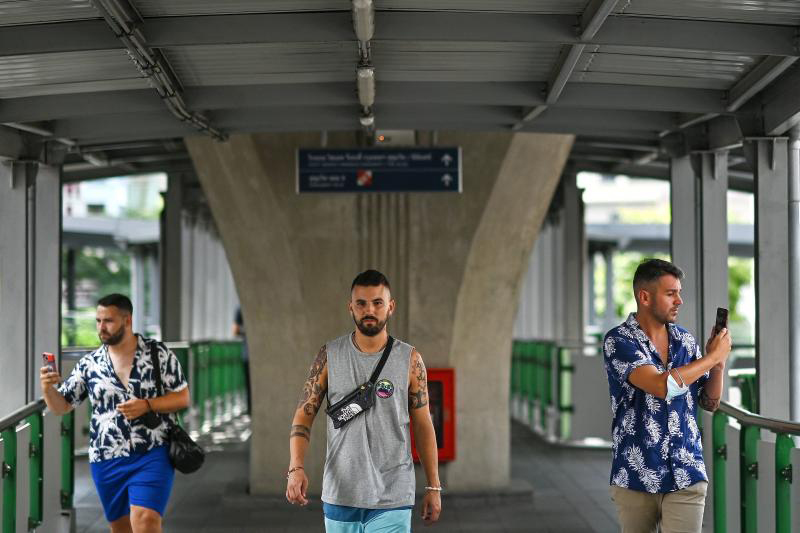
Thailand will soon welcome applications for its 10-year "golden visa" scheme aimed at wealthy foreigners, primarily those employed in tech sectors and digital nomads — or "work-from-Thailand professionals" as the Thai government puts it.
The plan is expected to bring in the equivalent of around €26 billion for the local economy over the coming decade.
Narit Therdsteerasukdi, deputy secretary general of the Thailand Board of Investment (BoI), told DW that he estimates that at least 50% of the applicants for the Long-Term Residence (LTR) visa programme will be from Europe.
"We are confident the LTR will attract significant interest in our target groups in Europe," he said.
"Thailand is already a favourite destination for Europeans. ... The responses we got from the prelaunch campaign reflect strong interest. I anticipate the LTR will become even more popular after the launch," he added.
EU countries are the second-largest investor in Thailand, after Japan, with €19.8 billion worth of outward stocks in Thailand as of the end of 2020. Outward stock measures Foreign Direct Investment (FDI) in enterprises located in foreign economies.
Who is eligible for Thailand's visa plan?
The new scheme, which will begin taking applications on Sept 1, offers work visas to foreigners across four categories.
The basic requirement is at least US$1 million (€983,000) in assets and an annual income of $80,000, although the rules change slightly across the groups. Applicants for the "Highly Skilled Professional" category will have to work in a sector deemed essential by the Thai government.
People in the "Work-From-Thailand Professionals" category, aimed mainly at employees of the tech sector, must be employed by a firm with at least $150 million in revenue over three years
Those applying for the "Wealthy Global Citizens" category will need to invest at least $500,000 in the local economy, including bonds and property.
All LTR visa holders will gain work permits and reentry rights. A LTR visa will be valid for 10 years and can be renewed. The benefits will apply for the main visa holder plus up to four dependents, including spouse and children.
Companies benefiting from the scheme will be exempt from laws requiring them to hire four Thai nationals per foreign employee, according to reports.
In 2018, Thailand launched its "Smart Visa" programme, which also offered incentives to wealthy foreign investors. Almost 50% of the endorsed applicants were from European countries, Mr Narit said.
He said the "High-Skilled Professionals" category under the new LTR visa "is pretty much an expansion in length and privileges of the Smart Visa programme."
New visas not a 'game changer' for business
The response from the European business community has been "generally positive, but most will wait and see," Guillaume Rebiere, executive director of the European Association for Business and Commerce in Thailand, told DW.
"Several businesspeople already in Thailand have expressed interest in applying as it would alleviate administrative overhead for them," he said. "To date, we have not seen a material uptick or interest in moving operations to Thailand in anticipation of the scheme," he added.
Hans van den Born, executive director of the Netherlands-Thai Chamber of Commerce, has seen the same response. "The first reactions have been lukewarm," he told DW. "I guess it needs more time and much more communication towards the target audience to get some traction."
Analysts reckon that the Thai government is being a little optimistic in its forecasts. It expects 1 million applicants for the LTR scheme by 2027. If each contributes $28,000 to the local economy, the whole scheme will be worth $27.6 billion, according to estimates by the BoI.
An underwhelming 1,200 visas have been issued under the "Smart Visa" programme since it started in February 2018, although the new LTR scheme offers far more incentives and promises to be less bureaucratic.
"I am not of the opinion that it will be a game changer for future Dutch investments as there are many more other important factors before companies decide to invest in our part of the world," van den Born said, adding that the scheme would likely help potential investors feel more welcome.
Thailand seeks pandemic recovery
Like most of Southeast Asia, Thailand has suffered heavily from a shortfall of visitors during the pandemic.
Tourism accounted for about a fifth of GDP pre-pandemic. Bangkok this week revised its growth figures for 2022 up to between 2.7% and 3.2%, following an unexpected surge of 2.5% in the second quarter of the year.
Lynn Tastan, country leader for Global Mobility Services at KPMG, an international accounting firm, told DW that the LTR visas have some shortcomings.
European pensioners may prefer to apply for Thailand's existing retirement visa, which has lower capital investment commitments than expected under the "Wealthy Pensioner" category of the LRT scheme.
"One of the key challenges is providing supporting documents in meeting requirements under the LTR," Ms Tastan said. "Easing the administrative burden for all parties under the LTR will be a key success factor," she added.
But the main appeal of the programme are the "Wealthy Global Citizen" and "Work-from-Thailand Professionals" categories, she said. Thailand currently has no visa or work permit programme specifically for foreigners who would fall into these groups.
Importantly, the LTR scheme says that foreigners in these two categories do not need a Thai sponsoring party to work or reside in Thailand, said Ms Tastan.
"Post-Covid, multinational companies are investigating and implementing hybrid or work-from-anywhere arrangements, where Thailand is an attractive destination, competing within the region for remote workers under the LTR Programme," she added.
Other Southeast Asian countries are also considering similar visa schemes.
Neighbouring Cambodia recently launched its "My 2nd Home" programme, which offers incentives to foreigners with $100,000 in investment capital. Indonesia is reportedly considering a five-year "digital nomad" visa to attract higher-spending visitors.
